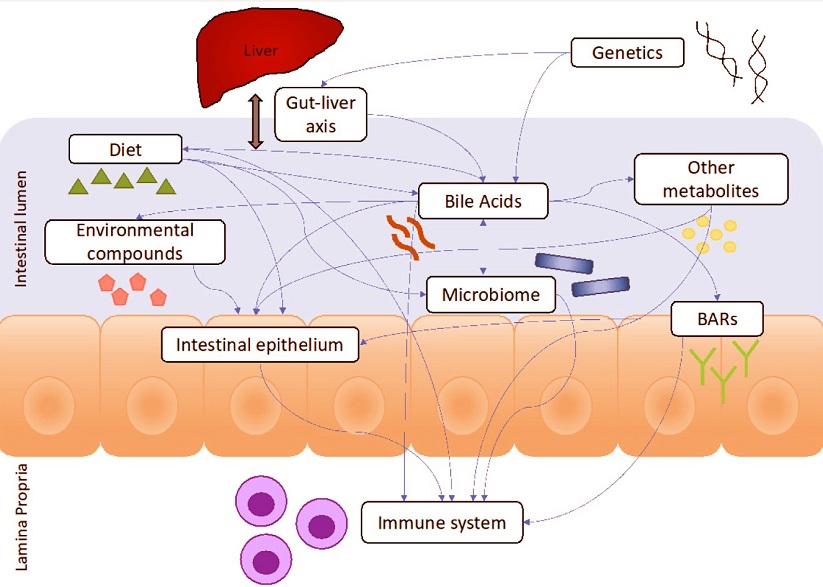Nikhil Prasad Fact checked by:Thailand Medical News Team Dec 25, 2024 3 months, 1 week, 2 days, 14 hours, 22 minutes ago
Medical News: Understanding the Basics of Inflammatory Bowel Disease
Inflammatory bowel disease (IBD), including Crohn’s disease and ulcerative colitis, affects millions worldwide, creating an urgent need for new treatments. Despite advancements, current therapies often fall short, as they only achieve sustained remission for a fraction of patients. With IBD's multifactorial nature, involving diet, genetics, environment, and the gut microbiome, researchers continue to explore alternative avenues for effective treatments.
 Bile Acids and Inflammatory Bowel Disease
Bile Acids and Inflammatory Bowel Disease
This
Medical News report delves into an innovative approach involving bile acids (BAs), substances known for their role in digestion but now recognized for their potential in managing inflammatory bowel disease. Groundbreaking studies by researchers from the Washington University School of Medicine have shed light on how Bile Acids might influence the pathogenesis of IBD and pave the way for novel therapeutic strategies.
The Role of Bile Acids in Gut Health
Bile Acids are critical to digestion, aiding in the breakdown of fats and absorption of vitamins. These amphipathic molecules are synthesized from cholesterol in the liver, transformed into primary Bile Acids, and subsequently metabolized by gut bacteria into secondary Bile Acids. This complex recycling process is vital for intestinal homeostasis, as Bile Acids act as signaling molecules regulating inflammation and microbial balance.
In IBD patients, the balance of Bile Acids is often disrupted. Studies reveal an increase in primary Bile Acids and a decrease in secondary Bile Acids, likely due to gut dysbiosis - a hallmark of IBD. This imbalance contributes to intestinal inflammation, altered microbiota, and impaired epithelial integrity, emphasizing the importance of restoring Bile Acid equilibrium for better disease management.
Key Findings from Recent Research
Washington University scientists conducted a comprehensive review of Bile Acid metabolism and its implications for IBD. The researchers identified significant alterations in Bile Acid composition among IBD patients, including elevated levels of primary Bile Acids like glycocholic acid and reduced levels of secondary Bile Acids such as deoxycholic acid. These changes highlight the intricate interplay between Bile Acids and gut microbiota, suggesting that modulating this interaction could alleviate disease symptoms.
Moreover, the study identified specific immune responses influenced by Bile Acids. For instance, certain secondary Bile Acids suppress pro-inflammatory cytokines, while primary Bile Acids often exacerbate inflammation. This dual role underscores the therapeutic potential of targeting Bile Acid pathways to fine-tune immune responses in IBD.
Potential Therapeutic Applications
The study findings highlight several promising strategies to harness Bile Acids for inflammatory bowel disease treatment:
-Dietary Interventions: Diets rich i
n specific fibers and low in fat can modulate Bile Acid metabolism, reducing inflammation and restoring gut health. For example, intermittent fasting has shown to increase beneficial Bile Acids and improve symptoms in animal models of colitis.
-Probiotics: By introducing beneficial bacteria, probiotics can restore Bile Acid balance and reduce inflammation. Certain strains have demonstrated success in increasing anti-inflammatory secondary Bile Acids and alleviating colitis in preclinical studies.
-Bile Acid Supplementation: Administering specific Bile Acids, such as ursodeoxycholic acid (UDCA) or lithocholic acid (LCA), has shown promise in reducing intestinal inflammation and enhancing epithelial barrier function.
-Receptor Agonists: Bile acid receptors, including FXR and TGR5, play pivotal roles in regulating inflammation and epithelial integrity. Agonists targeting these receptors have emerged as potential therapies, with several compounds already demonstrating efficacy in preclinical trials.
-Microbiome Modulation: Altering the gut microbiome to enhance Bile Acid metabolism is another promising avenue. Fecal microbiota transplantation and other microbiome-targeted therapies have shown potential in normalizing BA levels and improving IBD symptoms.
-Advanced Therapies: Emerging approaches, such as mesenchymal stem cell transplantation, aim to restore Bile Acid homeostasis and improve gut barrier function, offering hope for severe cases unresponsive to conventional treatments.
Challenges and Future Directions
While the therapeutic potential of Bile Acids is undeniable, challenges remain. Variations in Bile Acid composition among patients and conflicting study results underscore the need for more robust clinical trials. Additionally, understanding the precise mechanisms through which Bile Acids influence inflammation and gut health is essential for developing targeted therapies.
Researchers are also exploring the role of Bile Acids as biomarkers for disease activity and treatment response. Early findings suggest that changes in Bile Acid profiles could predict remission or relapse, offering a valuable tool for personalized medicine.
Conclusion
The intricate relationship between Bile Acids and IBD provides a fertile ground for innovative therapies. By targeting Bile Acid metabolism and signaling pathways, researchers aim to develop treatments that not only alleviate symptoms but also address the underlying causes of inflammation. These advancements hold the potential to revolutionize inflammatory bowel disease management, offering hope to millions of patients worldwide.
The study findings were published in the peer-reviewed journal: Biomedicines.
https://www.mdpi.com/2227-9059/12/12/2910
For the latest on Inflammatory Bowel Disease, keep on logging to Thailand
Medical News.
Read Also:
https://www.thailandmedical.news/news/the-probiotic-lacticaseibacillus-casei-ib1-can-help-combat-inflammatory-bowel-disease
https://www.thailandmedical.news/news/study-reveals-lower-taurine-levels-in-individuals-with-inflammatory-bowel-disease
https://www.thailandmedical.news/news/israel-researchers-warn-that-ibd-patients-taking-tumor-necrosis-factor-inhibitor-drugs-will-experience-decreased-covid-19-vaccine-efficacy
